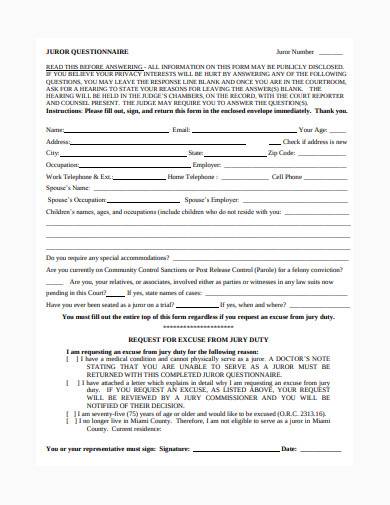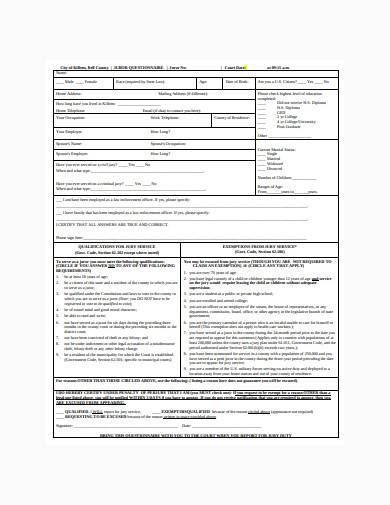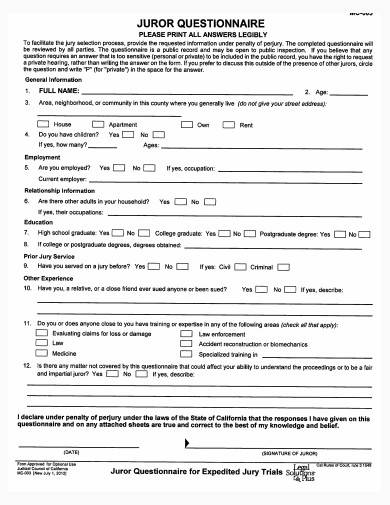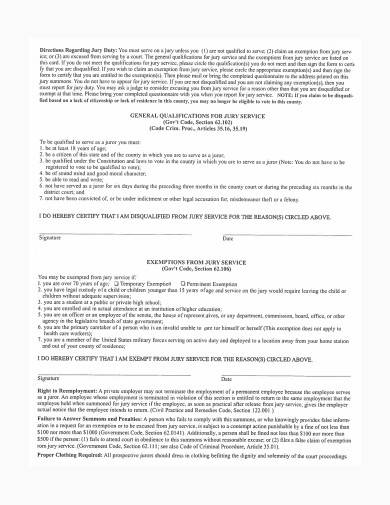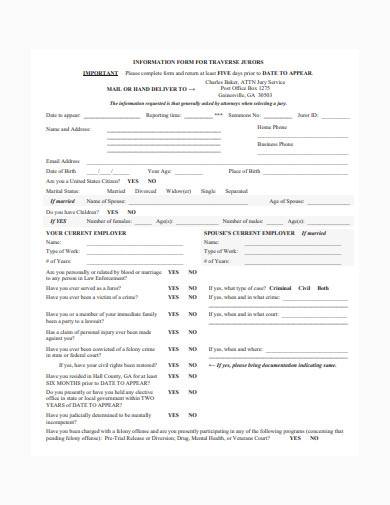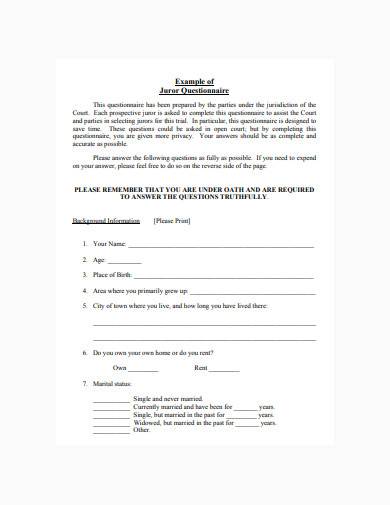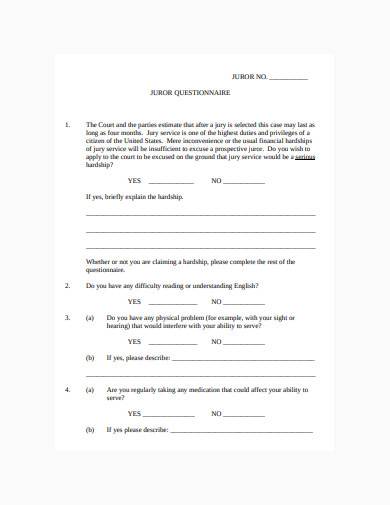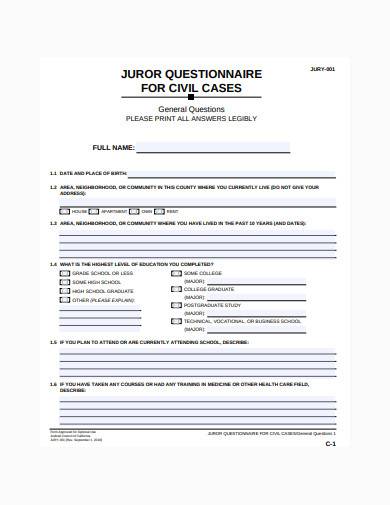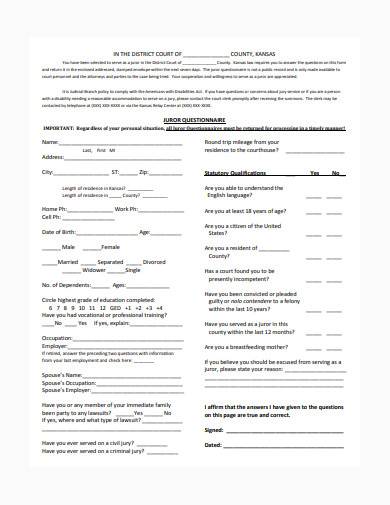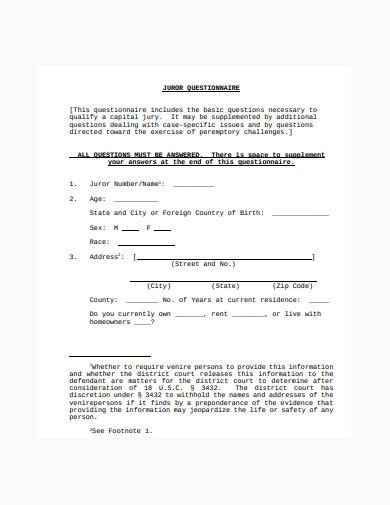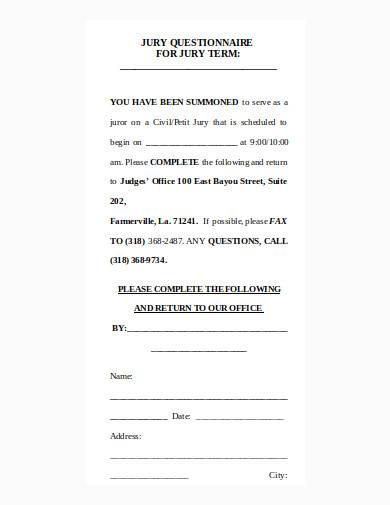“Speak the truth.”— the literal translation of the Latin term “voire dire,” which refers to the process of selecting the jury members. And indeed, the court who chooses the jury should ensure that the chosen jurors are responsible, reliable, and unbiased as they decide for a case’s final verdict. But before serving as a jury, one must first comply with various legal forms and eligibility requirements, such as a completed juror questionnaire form.
10+ Juror Questionnaire Samples in PDF | DOC
Anyone aged 18 years old and above who are citizens of the United States of America, and have not convicted felony can be a member of the jury. And of the 300 million people living in the US, it’s not a surprise that conducting a selection process with accuracy who can be jurors is a necessity. Since there are different states and counties, there are also varying forms of juror questionnaires. Each of them differs in their contents and layout. Discover the variations below:
1. Juror Questionnaire Sample
2. Court Juror Questionnaire Form Template
3. Juror Questionnaire Example
4. General Juror Questionnaire Template
5. Juror Questionnaire in PDF
6. Simple Juror Questionnaire Example
7. Basic Juror Questionnaire Sample
8. Formal Juror Questionnaire Template
9. District Court Juror Questionnaire Sample
10. Printable Juror Questionnaire Template
11. Juror Questionnaire in DOC
How to Complete a Juror Questionnaire Easily
One who gets summoned to be a jury must not fear or dread the process and the responsibility. After all, it’s part of being a good citizen of the state when helping the court have a verdict for a case. But, of course, there can be hesitations and concerns which may arise during the preliminary selection process, specifically in filing out juror questionnaires. So, to help anyone, including you, in completing the questionnaire form with ease, here are some tips that you must keep in mind:
1. Decide If You Want to Complete the Questionnaire Physically or Online
The advantage of processing legal forms, documents, and other requirements in today’s generation is that there are online options. That means submitting the questionnaire will be easier as opposed to heading to the court to provide the completed form. So, it would help if you chose which methods suit your needs best. And, if you decide to complete the questionnaire online, then you have to go to the website of your court, follow the instructions, guidelines, and screen prompts, and proceed to login into the eJuror site.
2. Answer Every Question; Mark “NA” Or “No” If There Are Questions Not Applicable to Your Situation
Regardless of your current personal situation and condition, you must answer the questionnaire from top to bottom. And if there are questions that don’t apply to you, then avoid leaving it blank. Instead, mark it with “NA,” which refers to non-applicable questions. But, always remember to state accurate and honest answers only, for you may face penalties if proven by the court that you’re lying.
3. Explain Your Answers Properly
Legal questionnaires often have yes or no questions. But it does not mean that only a mere yes and no will be the answers that one will state in it. Specifically, if there’s an area or a blank space allotted for further explanation, then a detailed explanation should be provided. This applies to disclosing exemptions to being a juror, such as medical condition hindering the capability to be present during the trials, or an occupation that exempts one from any form of jury duty.
Why did I Get a Juror Questionnaire, and What’s the Purpose of this Document?
The reason why you received the questionnaire is that you are eligible to be a juror. But do note that being eligible does not mean that you are one of “the” suitable jurors for the case. That’s why courts use the juror questionnaire. You can think of the questionnaire as a type of legal survey form. It is where you will provide answers and details that the surveyor, or the court, will use to determine your suitability. After the completion of the questionnaire, the court will pick among their prospective jury candidates via their answers and disclosed information in the questionnaire.
What Sort of Questions Must I Expect to be in a Juror Questionnaire?
Questions about your criminal conviction, medical condition, job, relationships, race, and ethnicity are some of the contents of the questionnaire. Also, there are some which require you to disclose your beliefs in the aspects of law and legalities.
Would I Face a Penalty if I Refuse to Fill Out the Juror Questionnaire?
Yes, you will face a penalty, and probably, a lawsuit filed against you by the state. Why? Because refusing to comply with jury duty and other legal procedures will hold you in contempt of court. The minimum jail time that you may be facing is six months, and more, if your refusal causes a lot of trouble in finalizing a large case.
Who Will Get to See and View the Details I Will Provide in the Juror Questionnaire?
Privacy and confidentiality are two of the topmost concerns that every individual raises, especially when it comes to providing and disclosing information about his personal life. And, if that’s your concern when you submit your answers in the questionnaire, then we’re delighted to assure you that only the authorized court staff can see, view, and read your questionnaire answers.
Lawyers and the court staff aim to get the most out of the questionnaires that they send to potential jurors. That’s why the accuracy of every information disclosed in it should be the top priority of the jurors so that penalties won’t be faced. And after choosing the final jurors, the court sends them legal notice forms, such as summons, to inform them what their next steps to take will be, and when the trial will begin.
Related Posts
Acceptance Speech
Scientific Reports Samples & Templates
Attendance List Samples & Templates
Sample Meeting Minutes Templates
Presentation Speech Samples & Templates
Ukulele Chord Chart Samples & Templates
Retirement Speech Samples & Templates
Weekly Schedule Samples & Templates
Contractual Agreement Samples & Templates
FREE 9+ Amazing Sample Church Bulletin Templates in PSD | PDF
Sample Business Card Templates
Sample Cashier Job Descriptions
Questionnaire Samples
FREE 10+ Sample HR Resource Templates in PDF
FREE 10+ HR Consulting Business Plan Samples in MS Word | Google Docs | Pages | PDF

